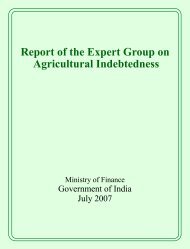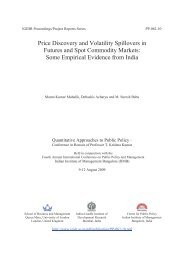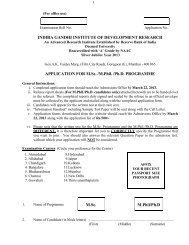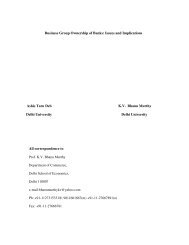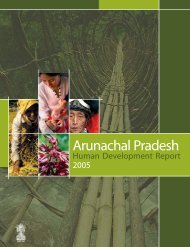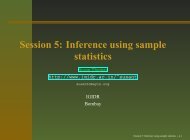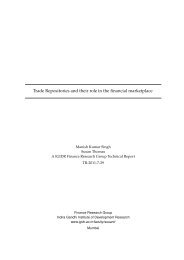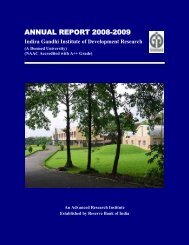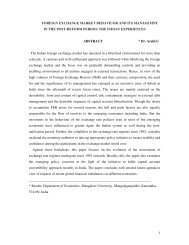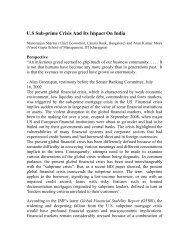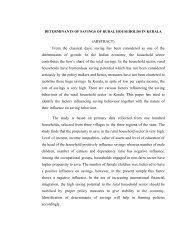- Page 1 and 2:
indiaLong years ago we made a tryst
- Page 3 and 4:
NATIONAL HUMAN DEVELOPMENT REPORT 2
- Page 5 and 6:
iiFOREWORDNATIONAL HUMAN DEVELOPMEN
- Page 7 and 8:
ivCONTENTSNATIONAL HUMAN DEVELOPMEN
- Page 9 and 10:
2OVERVIEW NATIONAL HUMAN DEVELOPMEN
- Page 11 and 12:
4OVERVIEWNATIONAL HUMAN DEVELOPMENT
- Page 13 and 14:
6OVERVIEWNATIONAL HUMAN DEVELOPMENT
- Page 15 and 16:
8STATE OF HUMAN DEVELOPMENT NATIONA
- Page 17 and 18:
10STATE OF HUMAN DEVELOPMENTNATIONA
- Page 19 and 20:
12STATE OF HUMAN DEVELOPMENTNATIONA
- Page 21 and 22:
NATIONAL HUMAN DEVELOPMENT REPORT 2
- Page 23 and 24:
16STATE OF HUMAN DEVELOPMENTNATIONA
- Page 25 and 26:
NATIONAL HUMAN DEVELOPMENT REPORT 2
- Page 27 and 28:
20STATE OF HUMAN DEVELOPMENTNATIONA
- Page 29 and 30:
22STATE OF HUMAN DEVELOPMENTNATIONA
- Page 31 and 32:
24STATE OF HUMAN DEVELOPMENTNATIONA
- Page 33 and 34:
26STATE OF HUMAN DEVELOPMENTNATIONA
- Page 35 and 36:
28STATE OF HUMAN DEVELOPMENTNATIONA
- Page 37 and 38:
30STATE OF HUMAN DEVELOPMENTNATIONA
- Page 39 and 40:
32ECONOMIC ATTAINMENTS AND WELL-BEI
- Page 41 and 42:
34ECONOMIC ATTAINMENTS AND WELL-BEI
- Page 43 and 44:
36ECONOMIC ATTAINMENTS AND WELL-BEI
- Page 45 and 46:
38ECONOMIC ATTAINMENTS AND WELL-BEI
- Page 47 and 48:
40ECONOMIC ATTAINMENTS AND WELL-BEI
- Page 49 and 50:
42ECONOMIC ATTAINMENTS AND WELL-BEI
- Page 51 and 52:
44ECONOMIC ATTAINMENTS AND WELL-BEI
- Page 53 and 54:
46ECONOMIC ATTAINMENTS AND WELL-BEI
- Page 55 and 56:
48EDUCATIONAL ATTAINMENTS AND WELL-
- Page 57 and 58:
50EDUCATIONAL ATTAINMENTS AND WELL-
- Page 59 and 60:
52EDUCATIONAL ATTAINMENTS AND WELL-
- Page 61 and 62:
54EDUCATIONAL ATTAINMENTS AND WELL-
- Page 63 and 64:
56EDUCATIONAL ATTAINMENTS AND WELL-
- Page 65 and 66:
58EDUCATIONAL ATTAINMENTS AND WELL-
- Page 67 and 68:
60EDUCATIONAL ATTAINMENTS AND WELL-
- Page 69 and 70:
62EDUCATIONAL ATTAINMENTS AND WELL-
- Page 71 and 72: 64HEALTH ATTAINMENTS & DEMOGRAPHIC
- Page 73 and 74: 66HEALTH ATTAINMENTS & DEMOGRAPHIC
- Page 75 and 76: 68HEALTH ATTAINMENTS & DEMOGRAPHIC
- Page 77 and 78: 70HEALTH ATTAINMENTS & DEMOGRAPHIC
- Page 79 and 80: 72HEALTH ATTAINMENTS & DEMOGRAPHIC
- Page 81 and 82: 74HEALTH ATTAINMENTS & DEMOGRAPHIC
- Page 83 and 84: 76HEALTH ATTAINMENTS & DEMOGRAPHIC
- Page 85 and 86: 78HEALTH ATTAINMENTS & DEMOGRAPHIC
- Page 87 and 88: 80HEALTH ATTAINMENTS & DEMOGRAPHIC
- Page 89 and 90: 82HEALTH ATTAINMENTS & DEMOGRAPHIC
- Page 91 and 92: 84HEALTH ATTAINMENTS & DEMOGRAPHIC
- Page 93 and 94: 86HEALTH ATTAINMENTS & DEMOGRAPHIC
- Page 95 and 96: 88HEALTH ATTAINMENTS & DEMOGRAPHIC
- Page 97 and 98: 90SOME OTHER ASPECTS OF WELL-BEING
- Page 99 and 100: 92SOME OTHER ASPECTS OF WELL-BEINGN
- Page 101 and 102: 94SOME OTHER ASPECTS OF WELL-BEINGN
- Page 103 and 104: 96SOME OTHER ASPECTS OF WELL-BEINGN
- Page 105 and 106: 98SOME OTHER ASPECTS OF WELL-BEINGN
- Page 107 and 108: 100SOME OTHER ASPECTS OF WELL-BEING
- Page 109 and 110: 102SOME OTHER ASPECTS OF WELL-BEING
- Page 111 and 112: 104SOME OTHER ASPECTS OF WELL-BEING
- Page 113 and 114: 106SOME OTHER ASPECTS OF WELL-BEING
- Page 115 and 116: 108SOME OTHER ASPECTS OF WELL-BEING
- Page 117 and 118: 110SOME OTHER ASPECTS OF WELL-BEING
- Page 119 and 120: 112SOME OTHER ASPECTS OF WELL-BEING
- Page 121: 114GOVERNANCE FOR HUMAN DEVELOPMENT
- Page 125 and 126: 118GOVERNANCE FOR HUMAN DEVELOPMENT
- Page 127 and 128: 120GOVERNANCE FOR HUMAN DEVELOPMENT
- Page 129 and 130: 122GOVERNANCE FOR HUMAN DEVELOPMENT
- Page 131 and 132: 124GOVERNANCE FOR HUMAN DEVELOPMENT
- Page 133 and 134: 126GOVERNANCE FOR HUMAN DEVELOPMENT
- Page 135 and 136: 128GOVERNANCE FOR HUMAN DEVELOPMENT
- Page 137 and 138: 130GOVERNANCE FOR HUMAN DEVELOPMENT
- Page 139 and 140: 132TECHNICAL APPENDIXNATIONAL HUMAN
- Page 141 and 142: 134BIBLIOGRAPHYNATIONAL HUMAN DEVEL
- Page 143 and 144: 136BIBLIOGRAPHYNATIONAL HUMAN DEVEL
- Page 145 and 146: 138GLOSSARYNATIONAL HUMAN DEVELOPME
- Page 147 and 148: 140THE STATE OF HUMAN DEVELOPMENTNA
- Page 149 and 150: 142THE STATE OF HUMAN DEVELOPMENTNA
- Page 151 and 152: 144THE STATE OF HUMAN DEVELOPMENTNA
- Page 153 and 154: 146INDICATORS ON ECONOMIC ATTAINMEN
- Page 155 and 156: 148INDICATORS ON ECONOMIC ATTAINMEN
- Page 157 and 158: 150INDICATORS ON ECONOMIC ATTAINMEN
- Page 159 and 160: 152INDICATORS ON ECONOMIC ATTAINMEN
- Page 161 and 162: 154INDICATORS ON ECONOMIC ATTAINMEN
- Page 163 and 164: 156INDICATORS ON ECONOMIC ATTAINMEN
- Page 165 and 166: 158INDICATORS ON ECONOMIC ATTAINMEN
- Page 167 and 168: 160INDICATORS ON ECONOMIC ATTAINMEN
- Page 169: 162INDICATORS ON ECONOMIC ATTAINMEN
- Page 172 and 173:
NATIONAL HUMAN DEVELOPMENT REPORT 2
- Page 174 and 175:
NATIONAL HUMAN DEVELOPMENT REPORT 2
- Page 176 and 177:
NATIONAL HUMAN DEVELOPMENT REPORT 2
- Page 178 and 179:
NATIONAL HUMAN DEVELOPMENT REPORT 2
- Page 180 and 181:
NATIONAL HUMAN DEVELOPMENT REPORT 2
- Page 182 and 183:
NATIONAL HUMAN DEVELOPMENT REPORT 2
- Page 184 and 185:
NATIONAL HUMAN DEVELOPMENT REPORT 2
- Page 186 and 187:
NATIONAL HUMAN DEVELOPMENT REPORT 2
- Page 188 and 189:
NATIONAL HUMAN DEVELOPMENT REPORT 2
- Page 190 and 191:
NATIONAL HUMAN DEVELOPMENT REPORT 2
- Page 192 and 193:
NATIONAL HUMAN DEVELOPMENT REPORT 2
- Page 194 and 195:
NATIONAL HUMAN DEVELOPMENT REPORT 2
- Page 196 and 197:
NATIONAL HUMAN DEVELOPMENT REPORT 2
- Page 198 and 199:
NATIONAL HUMAN DEVELOPMENT REPORT 2
- Page 200 and 201:
NATIONAL HUMAN DEVELOPMENT REPORT 2
- Page 202 and 203:
NATIONAL HUMAN DEVELOPMENT REPORT 2
- Page 204 and 205:
NATIONAL HUMAN DEVELOPMENT REPORT 2
- Page 206 and 207:
NATIONAL HUMAN DEVELOPMENT REPORT 2
- Page 208 and 209:
NATIONAL HUMAN DEVELOPMENT REPORT 2
- Page 210 and 211:
NATIONAL HUMAN DEVELOPMENT REPORT 2
- Page 212 and 213:
NATIONAL HUMAN DEVELOPMENT REPORT 2
- Page 214 and 215:
NATIONAL HUMAN DEVELOPMENT REPORT 2
- Page 216 and 217:
NATIONAL HUMAN DEVELOPMENT REPORT 2
- Page 218 and 219:
NATIONAL HUMAN DEVELOPMENT REPORT 2
- Page 220 and 221:
NATIONAL HUMAN DEVELOPMENT REPORT 2
- Page 222 and 223:
NATIONAL HUMAN DEVELOPMENT REPORT 2
- Page 224 and 225:
NATIONAL HUMAN DEVELOPMENT REPORT 2
- Page 226 and 227:
NATIONAL HUMAN DEVELOPMENT REPORT 2
- Page 228 and 229:
NATIONAL HUMAN DEVELOPMENT REPORT 2
- Page 230 and 231:
NATIONAL HUMAN DEVELOPMENT REPORT 2
- Page 232 and 233:
NATIONAL HUMAN DEVELOPMENT REPORT 2
- Page 234 and 235:
NATIONAL HUMAN DEVELOPMENT REPORT 2
- Page 236 and 237:
NATIONAL HUMAN DEVELOPMENT REPORT 2
- Page 238 and 239:
NATIONAL HUMAN DEVELOPMENT REPORT 2
- Page 240 and 241:
NATIONAL HUMAN DEVELOPMENT REPORT 2
- Page 242 and 243:
NATIONAL HUMAN DEVELOPMENT REPORT 2
- Page 244 and 245:
NATIONAL HUMAN DEVELOPMENT REPORT 2
- Page 246 and 247:
NATIONAL HUMAN DEVELOPMENT REPORT 2
- Page 248 and 249:
NATIONAL HUMAN DEVELOPMENT REPORT 2
- Page 250 and 251:
NATIONAL HUMAN DEVELOPMENT REPORT 2
- Page 252 and 253:
NATIONAL HUMAN DEVELOPMENT REPORT 2
- Page 254 and 255:
NATIONAL HUMAN DEVELOPMENT REPORT 2
- Page 256 and 257:
NATIONAL HUMAN DEVELOPMENT REPORT 2
- Page 258 and 259:
NATIONAL HUMAN DEVELOPMENT REPORT 2
- Page 260 and 261:
NATIONAL HUMAN DEVELOPMENT REPORT 2
- Page 262 and 263:
NATIONAL HUMAN DEVELOPMENT REPORT 2
- Page 264 and 265:
NATIONAL HUMAN DEVELOPMENT REPORT 2
- Page 266 and 267:
NATIONAL HUMAN DEVELOPMENT REPORT 2
- Page 268 and 269:
NATIONAL HUMAN DEVELOPMENT REPORT 2
- Page 270 and 271:
NATIONAL HUMAN DEVELOPMENT REPORT 2
- Page 272 and 273:
NATIONAL HUMAN DEVELOPMENT REPORT 2
- Page 274 and 275:
NATIONAL HUMAN DEVELOPMENT REPORT 2
- Page 276 and 277:
NATIONAL HUMAN DEVELOPMENT REPORT 2
- Page 278 and 279:
NATIONAL HUMAN DEVELOPMENT REPORT 2
- Page 280 and 281:
NATIONAL HUMAN DEVELOPMENT REPORT 2
- Page 282 and 283:
NATIONAL HUMAN DEVELOPMENT REPORT 2
- Page 284 and 285:
NATIONAL HUMAN DEVELOPMENT REPORT 2
- Page 286 and 287:
NATIONAL HUMAN DEVELOPMENT REPORT 2
- Page 288 and 289:
NATIONAL HUMAN DEVELOPMENT REPORT 2
- Page 290 and 291:
NATIONAL HUMAN DEVELOPMENT REPORT 2
- Page 292 and 293:
NATIONAL HUMAN DEVELOPMENT REPORT 2
- Page 294 and 295:
NATIONAL HUMAN DEVELOPMENT REPORT 2
- Page 296 and 297:
NATIONAL HUMAN DEVELOPMENT REPORT 2
- Page 298 and 299:
NATIONAL HUMAN DEVELOPMENT REPORT 2
- Page 300 and 301:
NATIONAL HUMAN DEVELOPMENT REPORT 2
- Page 302 and 303:
NATIONAL HUMAN DEVELOPMENT REPORT 2
- Page 304 and 305:
NATIONAL HUMAN DEVELOPMENT REPORT 2



